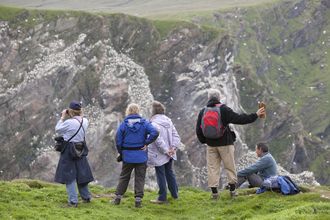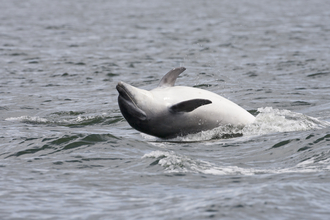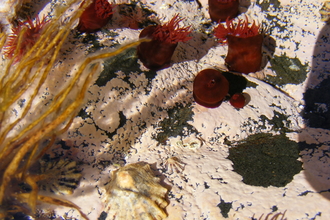
© Mark Hamblin/2020VISION
Where to explore the seashore
Seaside safari
If you spend all year dreaming about your seaside holiday, now’s the time to make the most the coast and enjoy the sea and its wildlife. Childhood memories of summer days spent paddling, shrimping, or dressing up in seaweed, rain or shine, can inspire a love for the sea that lasts a lifetime. Make this trip a bit different from the others - we're putting you in touch with the huge variety of seaside experiences on offer: snorkelling safaris, whales, dolphins, cliff-top birds and more. We host a huge number of seaside activities, especially during National Marine Week, and care for many coastal wild havens and islands.
Learn to love jellyfish, embrace the plaice and we defy you not to lose your heart to a basking shark!

© Paul Naylor http://www.marinephoto.co.uk/
Find seaside spots near you
As well as the ideas listed below, you’ll find more ideas on our page listing great places to go rockpooling, and our events pages.
North
Tees Valley Wildlife Trust
In June, park at Saltburn and walk along the base of some of the highest cliffs in England, looking up to the Trust’s nature reserve Hunt Cliff. Prepare to have your senses bombarded by the cry of kittiwakes, who having spent the winter months at sea return to the productive waters around the North Sea to breed. The cliff face is of regional importance for nesting kittiwakes and other seabirds such as fulmar and cormorant. These can be spotted from the beach at Saltburn, or watched from the cliff top as they soar on thermals or return to their nests with food for their young. Kittiwakes can be distinguished from other gulls by their black wing-tips.
The cliffs are also of interest for their house martin colony – a rare example of this bird nesting in its original, natural habitat. Later in summer, the cliff tops are splashed with colour as wildflowers begin to show on the coastal grasslands, including the scarce dyer’s greenweed, three species of orchid, and other plants such as spiny restharrow, sea plantain and wild carrot.
Yorkshire Wildlife Trust
Visit the Living Seas Centre at Flamborough; a fascinating place for all ages. Join Living Seas Officers for a Seashore Safari, come along for an evening talk, create a marine-themed masterpiece, or learn about Yorkshire's valuable shellfish. Discover the weird and wonderful creatures to be found hidden below the waves; learn how the upwelling of the Flamborough Front supports such a huge variety of life; watch locally-shot video of undersea kelp forests and chalk reefs; embark on a storyboard trail around Flamborough Cliffs; and find out how we can all do our bit for marine wildlife, all while enjoying a cup of tea or ice cream.
Midlands
Lincolnshire Wildlife Trust
Lincolnshire’s long sandy beaches are great for scavenger hunts for shells, sea urchins, mermaid’s purses, and other washed up treasures. There’s also the chance of seeing harbour porpoise, grey and common seals, and a variety of coastal birds. The best sites to try are Lincolnshire Wildlife Trust’s Gibraltar Point and the Lincolnshire Coastal Country Park. Events at Gibraltar Point include sea dipping – the sandy coast version of pond dipping – when all sorts of sea life can be seen.
South
Cornwall Wildlife Trust
Go grey seal spotting off the beautiful Looe Island where Cornwall Wildlife Trust has been monitoring seal numbers since 2000. Visitors to Looe Island are almost guaranteed to see the seals and help the wardens spot and record individual seals, like Looe Seal, Duchess, Pawprint and Boomerang, who you can identify by the unique patterns on their fur. Visit between Easter and September.
Feeling a little more adventurous and don’t mind getting wet? Why not go snorkelling in Durgan’s mysterious eel grass beds? In the summer months, as the water temperature rises, you can snorkel through the mysterious eel grass beds off Durgan and Greeb beach in the waters of the stunning Helford Passage. Cornwall Wildlife Trust regularly run snorkel safari events here where their marine experts can get you up close to wonderful marine life such as pipe fish, bass, plaice, large hermit crabs and the incredibly rare black-faced blenny.
Devon Wildlife Trust
Wembury offers some of the best rockpooling in the UK. The popular tourist beach has a rocky shore, hiding hundreds of rockpool creatures: from velvet swimming crabs to tompot blennies. Every spring and summer the Trust runs regular guided rockpool safaris led by trained staff who reveal the secrets of the pools.
Dorset Wildlife Trust
Kimmeridge Bay (Purbeck Marine Wildlife Reserve) is one of the best spots for rockpooling, snorkelling, and kayaking in Dorset. The ‘sea safari’ snorkel trail offers clear, calm waters. There’s also a waterproof guide to help you identify species you may encounter, like sand eels, tompot blennies, and kelp seaweed. Take a ‘Seashore Explorers’ pack out with you, which includes a eco-friendly crabbing kit, seashore ID guides, and magnifying bug pots, helping you and your family make the most of the marine wildlife along the coast at Kimmeridge. We also have a Kayak Safari, complete with goggle viewers and glass bottoms – perfect to see the wildlife lurking beneath the waves!
Kent Wildlife Trust
The internationally important wetland reserve at Kent Wildlife Trust’s Oare Marshes, near Faversham, is a must to visit in spring and autumn for its great flocks of wildfowl and waders - in particular black-tailed godwits in their hundreds. Also look out for marsh harriers, merlin, short-eared owls, snipe, and bearded tits amongst the impressive array of species. From here, the antics of a colony of common seals can also be observed at Horse Sands in the Swale Estuary.
East
Essex Wildlife Trust
The Naze at Walton is famous for its wildlife, geology, heritage, erosion, coastal community, history, and beach. At low tide, the beach is a superb place for rock-pooling, birdwatching, and fossil hunting – with a little patience and luck, you could uncover fossilised shark’s teeth!
Isle of Man
Manx Wildlife Trust
The Isle of Man is a fantastic place to watch marine megafauna - it’s a hot spot for basking sharks in the summer, with an occasional leatherback turtle or sun fish. Regularly spotted are minke whale, harbour porpoise, common dolphin, bottlenose dolphin, and Risso’s dolphin, and a year-round population of grey seals and a few common seals. Occasionally humpback and killer whales make an appearance.
In summer, basking sharks can be spotted all round the Isle of Man, though the best area for seeing them is the south west coast of the Island from Peel down to the Calf of Man - they can be seen from land or a boat and often come close to the shore. Dolphins and whales can be seen all year, with different species seen at different times. For a chance of a close up look, you can try your luck on an organised boat trip, but you can get a great view on a coastal walk with binoculars.
The Manx Wildlife Trust has set up 6 marine scene stations around the island where you are likely to see marine mega fauna, with species information boards as well as binoculars allowing you to see the animals clearly. Find them at:
- Bradda Glen in Port Erin
- Kallow Point in Port St Mary
- Marine Drive in Douglas
- Niarbyl
- Breakwater in Peel
There are also plans afoot to put two more in once funding is available.
Wales
The Wildlife Trust for South and West Wales
You can see seals all around Pembrokeshire's rocky and twisted coastline, but only on Skomer Island will you hear them sing. Their melancholic siren songs travel far in the evening breeze. Get up close to the Cardigan Bay ‘big three’ for an adventure you’ll never forget! This fantastic marine wildlife experience is guaranteed to whet your appetite.
Go on a journey with Dolphin Survey Boat Trips to see the heavenly Welsh coastline and fantastic wildlife in action. Witness dolphins, harbour porpoise and grey seal in their natural environment playing and posing for the camera. On land, the Cardigan Bay Marine Wildlife Centre is manned by a team of dedicated volunteers who help monitor the local marine wildlife, and are happy to answer your marine wildlife questions and show you around the centre.
Scotland
Scottish Wildlife Trust
Dive into Scotland's first snorkel trails: self-led trails around Ullapool and the Isle of Harris feature a combined fifteen sites to explore! In Ullapool, the North West Highlands Snorkel Trail features nine beaches and bays on the coast of Wester Ross and Sutherland, while the North Harris Trail on the Isle of Harris includes six spots, all bursting with marine life. Beginner and advanced snorkellers can dive down to see the amazing diversity of Scotland’s seas, including dogfish, barrel jellyfish, and sea urchins.
Islands
Alderney Wildlife Trust
Longis Nature Reserve - Walking through the reserve's coastal trails you may glimpse rare plant species such as Small Hare’s-ear, Sand Crocus, Bastard Toadflax and Orange Bird’s-foot, as well as the endemic Alderney Sea Lavender on the rocky shore. Two bird hides overlook the reserve’s freshwater ponds, offering unrivalled views of waterfowl, songbirds and migrants alike.
Ramsar Site - Alderney and Burhou achieved the Ramsar designation in 2005 through their regionally, nationally and internationally important populations of seabirds. In particular the islets of Ortac and Les Etacs support around 1% of the world population of Northern Gannets (Morus bassanus).
Isles of Scilly Wildlife Trust
The summer season sees the return of thousands of seabirds, including special species such as Manx shearwater, European storm petrels (of which Scilly hosts internationally important breeding populations), lesser black-backed gull, and puffin. Read more about the Scilly Wildlife Trust’s seabird population here and here.
Throughout the summer, dependent on marine conditions, you may also be lucky enough to spot basking shark, common and Risso’s dolphin, and harbour porpoise. Seals are possible to see all year round, although the summer is a good time to see them from a tourist boat. For a peaceful experience, go island hopping and ask a local which bay to walk to at high tide to spot these wonderfully inquisitive creatures. Sit still and wait for one of those watchful heads to pop up and stare!
How to prepare
Checklist: Bucket and spade, snorkel and mask, barefeet for the sand, and prepare to lose all sense of time gazing into rockpools or out to sea. Tide timetables or local knowledge can prevent accidents - do your research in advance. Waterproofs and woollens are a must on a boat no matter how optimistic the forecast!
If you can't get to these places
Step inside The Wildlife Trusts’ 360 images of the coastline we care for – explore those beaches and hear the sea from your laptop. Check out our Living Seas pages to find out more about our marine conservation work - enjoy the winning art of our Undersea Art Award!
More wildlife experiences
From seeing colourful wildflowers to spotting magnificent birds of prey, we can help you get closer to wildlife across the UK.







